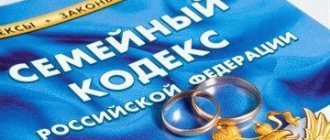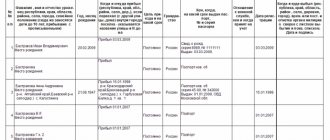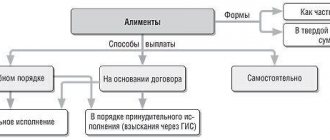Home / Family law
Back
Published: 12/07/2019
Reading time: 4 min
0
401
Raising and caring for children is your responsibility as a parent. When a minor or teenager commits a crime, the punishment will inevitably affect the family members who are primarily responsible for it. In the vast majority of cases, parents pay administrative fines, since the minor does not have the appropriate financial capabilities.
- In what cases and up to what age do parents pass responsibility?
- Administrative responsibility
- Responsibility of parents for violation of traffic rules by children
- Civil liability
Normative base
The responsibilities of parents towards children and the responsibility imposed for their actions are regulated by the following documents:
- International Convention on the Rights of the Child ();
- Family Code ();
- Civil Code ();
- Code of Administrative Offenses ( );
- Criminal Code (–).
Measure of parental responsibility
Domestic legislation rightfully classifies children as the most vulnerable categories of citizens, therefore their rights and interests must be protected as a priority. By forcing parents to properly raise their children, the state pursues several goals: to raise worthy citizens, to protect society from illegal acts of minors, to punish adults who have not fulfilled their responsibilities towards their offspring.
Parents living separately from minors are also held accountable, since this fact does not relieve them of the responsibility to properly raise their child.
Parental rights end when the teenager reaches 18 years of age or earlier upon actual acceleration. At the same time, the citizen’s parental responsibilities towards his son or daughter are terminated.
Responsibilities provided for by family law
The articles of the Family Code of Russia provide a list of the main responsibilities that are assigned to adults raising children of any age. This list is not specific, but only defines the areas of family and social life in which mom and dad should take equal part.
Important! For repeated violations of the established order of upbringing, adults may be partially deprived of parental rights. With systematic evasion of one's duties, the legal status of kinship ceases completely.
Thus, the main areas of life in which adult relatives must participate include:
- financial support, that is, providing the child with housing and food, clothing, personal hygiene products and other things necessary in everyday life;
- emotional education, that is, teaching the rules of behavior in society, as well as assistance in socialization and independent personal development;
- comprehensive education, which includes attending kindergarten and school, as well as additional hobby groups;
- legal protection of the child is necessary if there is a need for the child to participate in legal disputes or law enforcement proceedings.
Considering that parents carry out the comprehensive development of the child from birth, then violation of generally accepted rules of behavior is a shortcoming of adults. Therefore, all successful attempts to cause material harm to a child entail financial losses for adults.
Types of liability
All parents and guardians of Russian minors bear two types of responsibility:
- For unfair actions towards a child.
- For the actions of your children (wards).
If everything is more or less clear with the first point (every parent knows that they must feed, clothe, educate, socialize and care for their child), then the second still raises many questions among adults and children.
Some teenagers, due to improper upbringing and early acceleration, demand greater freedom of action, not realizing that expanding rights automatically leads to increased civic responsibilities and responsibility for their actions.
Growing up of a minor entails an increase in the citizen's legal capacity. The moment of its occurrence is recorded in:
- – full legal capacity beginning at the age of 18;
- – partial legal capacity, which appears from the age of 14.
Not everyone understands that partial legal capacity presupposes the responsibility of a growing Russian for committing any illegal acts. The argument of fathers and mothers: “He’s still small!” does not work in these cases. Depending on the severity of the offense, the teenager may be held administratively, civilly or criminally liable.
For parental responsibility to arise for the actions of a minor, one unlawful act by the teenager is sufficient. Responsibility for violation of the rights of a child or improper upbringing occurs if the actions of the parent (guardian) are systematic.
Definition of rights and responsibilities
Upon reaching the age of 18, all Russian citizens receive full legal capacity and capacity, that is, they receive all the rights and responsibilities of a full-fledged citizen of the country.
From this time on, they can completely manage their lives and property: get married, get a job, sell or buy real estate.
With rights come responsibilities: a citizen is fully accountable to the court for his actions and bears full responsibility.
Until the age of 18, a citizen is considered incompetent, that is, limited in rights and responsibilities. In this case, two concepts are distinguished:
- A minor citizen is a teenager under 14 years of age, and he is also incompetent.
- Incompetent – under 18 years of age. At the same time, at the age of 14-18 years, limited legal capacity applies: a teenager can be responsible for some actions, but is obliged to ask for parental permission.
It is worth noting: a citizen may be incompetent not only due to age, but also due to mental disorders, due to which he is not able to be responsible for his actions.
Until the minor reaches the age of majority, parents or guardians are responsible for all his actions, they also represent the interests of the teenager in court and defend his rights. Depending on the age and the offense committed, the degrees of responsibility of children and adults differ.
Administrative responsibility
Administrative offenses of adults and adolescents are similar. Types of frequently occurring illegal acts:
- drunkenness, use of psychotropic substances;
- appearing in a public place or on the street while intoxicated;
- violation of traffic rules;
- petty theft;
- antisocial behavior;
- causing minor bodily harm.
Adolescents who have reached the age of 14 are subject to full administrative liability. Punishment for the committed offense is chosen in accordance with the norms of the Code of Administrative Offenses of the Russian Federation. In particular, for improper actions the minor will be liable with his own property (to compensate for the harm caused) or bear labor service.
If the perpetrator cannot compensate for property damage on his own due to the lack of his own income, his parents (guardians) will have to do this. The decision about who will pay is most often made on a voluntary basis. If parents refuse to compensate the injured party, they may be forced to do so in court.
The exception is cases when it is proven that the teenager who committed the offense was at that moment under the control of another person (for example, a teacher leading classes at school, a teacher at a children's camp, etc.). Then responsibility for its action, and, consequently, the need for compensation for damage, will fall on the relevant institution.
Parents will also be held administratively liable if the child is under 14 years of age.
The amount of administrative punishment depends on the severity of the act. If the teenager’s actions did not cause material damage, the court will limit itself to issuing a public reprimand or warning.
Any material damage is subject to compensation.
In addition, the perpetrator may be subject to a fine ranging from 30 to 100% of the minimum wage. For more serious offenses or the commission of several offenses at the same time, the fine will be 3-5 minimum wages. Also, in relation to the perpetrator, the court can choose a preventive measure in the form of arrest for a period of 15 days (nowadays it is rarely used).
Liability for harm caused by minor children
The birth of children entails not only new rights, but also obligations. Parents are responsible for the moral education of the younger generation. The task of the father and mother is to raise a worthy heir, to provide favorable conditions for life, growth and personal development.
If a child violates public order or commits unlawful actions against other persons or other people’s property, the minor’s representatives are responsible for such actions. Depending on the severity of the offense committed, the Criminal, Civil or Administrative Code is applicable.
Civil (property) liability
Persons who are responsible for the actions of minors are identified in Articles 1073 and 1074 of the Civil Code of the Russian Federation. The legislator divided responsibility for the actions of minors under fourteen years of age and children from 14 years of age to adulthood.
For the actions of persons under 14 years of age the following are responsible:
- Parents.
- Trustees and guardians.
- Employees of organizations for children left without adult care.
- Employees of educational institutions.
- Employees of medical institutions.
- Organizations providing child care if an illegal act was committed during the period of supervision.
At the age of 14 to 18 years, a teenager is independently responsible for unlawful acts. But in the absence of funds to compensate for the damage caused, the responsibility passes to the parents or guardians. Adults are responsible for their actions with their own property and personal freedom.
Parents' responsibility for offenses committed by minor children remains for three years after deprivation of parental rights.
According to the legislator, the ability to commit unlawful acts directly depends on improper upbringing. Before the deprivation of rights, the father and mother could be negligent in their duties. As a result, the child developed a tendency towards antisocial behavior. When children are in preschool, educational, sports institutions or are in a camp, responsibility for their actions lies with educators and teachers. A facility that fails to properly supervise minors may be subject to liability.
For example, a student did not show up for classes; while he was absent, he committed theft from a store. Under these circumstances, educators must be punished. The violation in this situation is that the teachers did not react in any way to the student’s absence and did not inform parents or law enforcement agencies. While staying in an entertainment center or kindergarten, responsibility is assigned to the employees of these institutions. In such situations, the administration of the institution has a chance to evade responsibility. To do this, it is necessary to prove that the student committed the act as a result of poor upbringing. If parental negligence is established, the damage will be compensated from the family budget. During extracurricular hours and during the holidays, responsibility for the actions and leisure of minors lies with the parents.
Criminal liability
The Criminal Code of the Russian Federation regulates the age limit at which criminal penalties can be applied to a teenager. According to paragraph 1 of Article 20 of the Criminal Code of the Russian Federation, criminal liability begins at the age of 16. Paragraph 2 of the article contains a remark. Criminal liability may arise from the age of 14 when committing particularly serious crimes:
- premeditated murder;
- sexual assault;
- intentional infliction of harm to health;
- theft of someone else's property;
- vehicle theft;
- extortion;
- terrorist activities.
Trial proceedings for persons aged 14 to 16 years are carried out with particular care. When assigning punishment, the following are taken into account:
- Compliance of a minor with his age in terms of physical and intellectual indicators.
- Mental development and education.
- The ability to understand and evaluate one's actions.
- Conditions of life and education.
As a rule, measures of compulsory pedagogical influence are applied to this age category for the purpose of re-education. The child may be released under the supervision of parents or to a specialized educational and medical institution.
Parents are the representatives of minors in court. During the trial, the court examines the living conditions of the teenager and the participation of official representatives in the formation of his personality. The legislator equates the level of education and the tendency to commit illegal acts.
According to statistics, most teenage crimes are committed by children from disadvantaged families. The responsibility of parents for the upbringing of their wards is prescribed in Article 61 of the Family Code. Violation of this provision is punishable under Article 156 of the Criminal Code of the Russian Federation. To apply it in court, the following circumstances must be proven:
- parents are negligent in raising their child;
- illegal behavior is encouraged in the family;
- immoral lifestyle of the trustees;
- the child is not provided with educational leisure;
- insufficient attention from parents.
If persistent violations are detected, the court has the right to limit or deprive parental rights.
Criminal liability of parents for the acts of minor children provides for the following penalties:
- fine up to 100,000 rubles;
- compulsory work up to 440 hours;
- correctional labor for up to two years;
- forced labor for up to three years;
- deprivation of the right to engage in certain types of activities for up to 5 years;
- imprisonment for up to three years.
Additionally, adults are responsible for compensation for damages received in connection with the criminal act of a minor. For example, when harm is caused to health, the parents of the offender are obliged to reimburse the victim for expenses for treatment, as well as pay moral compensation.
Penalties under the Administrative Code
Administrative responsibility for minors begins at the age of 16. Teenagers are responsible for their actions with their own property and earnings. In the absence of income, payment of fines and compensation is shifted to adults. Administrative responsibility for children under 16 years of age rests with parents. Such juvenile offenses include:
- avoidance of studies;
- socially dangerous acts;
- violation of traffic rules;
- petty theft and hooliganism;
- antisocial offences.
Penalties:
- fine (half the minimum wage);
- a public apology to the victim;
- self-repair of damage.
The fine and payment of compensation can only be applied to teenagers who have independent income. In the absence of such, material and property liability is assigned to the legal representatives in accordance with the norms of civil law.
The legislator draws a parallel between illegal acts and the level of mental development and adult participation in education. The Code of Administrative Offenses regulates penalties for parents and guardians. Punishment is imposed for violations related to:
- lack of social education;
- inadequate provision;
- training;
- rights and interests of children.
Article 5.35 of the Code of Administrative Offenses of the Russian Federation establishes a fine of 100 to 500 rubles as punishment for improper performance of parental responsibilities. Delinquency is a consequence of lack of good education, sufficient parental attention and moral values. Violations under this article can be either an independent basis for applying punishment or an additional circumstance in connection with an offense committed by a teenager.
According to the general rule of Article 4.5 of the Code, the statute of limitations for an administrative offense remains for 2 months. In the case of a court decision - 3 months.
Responsibility for improper education
Parental responsibility for minor children begins from the moment of their birth and lasts until the age of 18.
In Russian legislation, the rights and obligations of trustees are enshrined in Article 61 of the Family Code. This article regulates the equality of father and mother in education.
According to the provisions of the Convention on the Rights of Children, it is the older generation who bears the primary responsibility for the upbringing and maintenance of their heirs. World legislation obliges us to provide material and moral conditions for a full life and development of the younger generation.
Article 63 of the Family Code of the Russian Federation combines several concepts into the term “upbringing”:
- Promotion of physical development.
- Caring for the mental, moral and moral development of the individual.
- Ensuring an appropriate level of education (provide general education).
Responsibility arises when citizens systematically evade parental responsibilities.
The grounds for liability are:
- Improper performance of one's duties.
- Abuse of parental rights.
- Intentional commission of acts causing physical and psychological harm to a minor.
Improper implementation means neglect of the child’s health, encouragement of hooliganism, and ignoring school meetings.
An example of abuse of one's rights is concealing the location of a minor from the second parent or kidnapping. Psychological and physical damage can be caused by physical punishment and immoral behavior of adults. Evasion of obligations to provide, educate and raise children threatens trustees with administrative and criminal liability. The punishment for this violation, depending on the circumstances, can be either an administrative fine or imprisonment.
Civil responsibility
The extent of parents' property liability for any harm caused by the child's actions to third parties depends on the nature of the offense and the age of the child. Damage caused to minors under 14 years of age is compensated by parents in full. This applies, for example, to damage to goods in a store, a broken window at a neighbor’s house, etc.
Teenagers aged 14-18 years old compensate for property damage on their own, since they are already partially capable. If the amount of damage caused is large or the child does not have income to cover it (which happens most often), the parent (guardian) will also have to compensate for the damage or loss of property.
Citizens deprived of parental rights may also be involved in compensation for damage caused by their offspring. In this case, no more than 3 years must pass from the moment of deprivation of rights.
Parents are the legal representatives of their child
This means that mom and dad represent the interests of their children in various government institutions - schools, kindergartens, clinics, etc., as well as during the investigation of cases and during legal proceedings.
In almost all social organizations, at least one of the parents is always asked for written consent to any actions regarding a minor. For example, such consent is necessary when a kindergarten plans to give a child an age-related vaccination or if a school student is sent to a competition in another city. Parents, by signing consent or refusing to sign, thereby express their will for the child. This usually happens before he turns 18 years old - as a general rule, it is from this age that full legal capacity begins. The exception is cases when a teenager already has an independent income from the age of 16 (emancipation) or got married before reaching adulthood - in such situations he is equated to an adult and becomes fully capable.
The following rights are equivalent to parental rights:
- guardians, trustees;
- adoptive parents;
- representatives of children's institutions where the child is kept without care (for example, due to the death of both parents).
In accordance with family law, parents and persons equivalent to them bear the following responsibilities in relation to their children:
- moral education;
- participation in physical development;
- creating the necessary conditions for living and subsistence - providing clothing, food, etc.;
- organization of the educational process and leisure;
- representation of interests as necessary in social and medical institutions, investigative, judicial and other bodies.
Turning to various legal areas, it can be seen that children can bear independent responsibility even before reaching adulthood . For example, according to administrative law, responsibility begins at the age of 16; under criminal law, in certain cases, you can become an accused at the age of 14. It turns out that children are still responsible for their behavior independently even before the age of 18? Yes, this is true, but at the same time the parents represent the interests of the child.
For example, when a 15-year-old child is accused of committing murder, a parent must come with him to all investigative actions, participate in interrogations (read about the features of interrogating minors), in confrontations and subsequently in a court hearing, thereby representing the interests of the teenager. This means that mom or dad, as adults and more experienced people, will be able to quickly navigate in the event of a violation of their son’s rights and react in a timely manner (submit a petition, make comments in the protocol, object to some investigative action due to illness, etc.) .
Question: What if a child committed an offense or caused harm to someone before the age of 14 or 16, is the parent responsible for him?
Here it is necessary to distinguish between types of responsibility. Father and mother almost always bear civil liability for damage to a minor, but there are exceptions.
They do not bear criminal or administrative liability for the actions of the child under any circumstances. At the same time, the parents themselves may be brought to criminal or administrative liability for improper upbringing, which was the reason for the teenager to commit a crime or offense.
Let's talk about the types of parental responsibilities in more detail.
Criminal liability
In the Russian Federation, citizens over 16 years of age are subject to criminal liability. If a particularly serious crime has been committed - from the age of 14. In particular, from the age of 14, a teenager is independently responsible for the following acts:
- intentional infliction of harm to health;
- murder, kidnapping, rape and other acts of a similar nature;
- robbery;
- theft, robbery;
- vandalism;
- vehicle theft;
- terrorism, deliberately false reporting of terrorist attacks;
- malicious hooliganism;
- attempted extortion;
- intentional destruction and damage to property of third parties;
- hostage taking;
- storage, carrying, use of weapons, ammunition, explosives;
- trade in narcotic and psychotropic substances;
- damage to transport and communications.
If a child under 14 years of age is caught in such actions, the parents will bear responsibility for him and will be given a punishment in the manner prescribed by the norms of the Criminal Code of the Russian Federation.
In what cases and up to what age do parents pass responsibility?
Parental responsibility for the misconduct of minor children arises until the latter reaches 18 years of age. Responsible persons also include guardians, adoptive parents, trustees and other citizens caring for the child in accordance with the law. It is important to note here that family members (grandparents, brothers, sisters) whose children remain in temporary care or supervision are not responsible for their misconduct.
There are three forms of responsibility, as well as age limits, upon reaching which citizens are independently responsible for their unlawful acts:
- administrative - for an offense contrary to the Administrative Code starting from the age of 16 (Article 2.3 of the Code of Administrative Offenses of the Russian Federation);
- criminal - for a crime contrary to the special part of the Criminal Code starting from the age of 16 (Article 20 of the Criminal Code of the Russian Federation);
- civil law - for causing property and material damage contrary to the Civil Code starting from the age of 14 (Article 1074 of the Civil Code of the Russian Federation).
From this age until the age of 18, the parents and legal representatives of the child assume partial responsibility. It should be noted that there is a list of crimes for which criminal punishment is possible even earlier - after 14 years. Among them (Part 2 of Article 20 of the Criminal Code of the Russian Federation):
- physical violence leading to grave consequences;
- premeditated murder;
- sexual assault;
- robbery, robbery, theft;
- participation in terrorist activities;
- theft of drugs, explosives, weapons;
- destruction or damage to property with aggravating consequences;
- other grave and especially grave crimes.
A minor may be released from criminal liability if a mental retardation is established. The punishment for parents will correspond to the severity of the act, taking into account aggravating circumstances and other factors.
If the child’s actions bear a trace of cruel treatment, the legal representatives can be imprisoned for up to three years (Article 156 of the Criminal Code of the Russian Federation).
Prevention of illegal actions of children
The words that a child’s inappropriate behavior is a natural consequence of improper upbringing have long become commonplace. However, some fathers and mothers forget to regularly remind their child of the need to comply with moral and ethical standards and constantly monitor their behavior. For example, the concept of private property instilled in a child in time will protect him from committing thefts and other crimes of a property nature.
With teenagers, starting from 12-13 years old, it is necessary to have conversations about the consequences of the onset of legal capacity and the obligation to be responsible for their actions.
For example, not all young people understand that they personally will have to compensate for the damage caused. In addition, teenagers should know that committing crimes in a group is an aggravating circumstance. This will prevent them from participating in antisocial acts “for company.”
Civil liability of parents for children
It is customary to differentiate liability for harm caused by minors depending on their age:
- from 14 to 18 years old;
- young age up to 14 years.
Children 14-18 years old
In accordance with the provisions of Article 1074 of the Civil Code of the Russian Federation, adolescents from 14 to 18 years of age are independently responsible for their actions that cause harm to others . And only if they are financially unable to do this, then the parents are partially or fully involved in the obligation of material compensation (this form of responsibility is called “subsidiary”).
This rule does not mean that automatically in every case when a teenager after 14 years of age does not have enough property, mom and dad pay for it. The court, when collecting the missing amount from the parents, is obliged to motivate its decision.
And only if it is established that there are deficiencies in upbringing that led to misconduct and harm, the judge can foreclose on the property and finances of the legal representatives. As a general rule, such representatives usually include guardians, adoptive parents, foster parents, as well as representatives of organizations intended for the residence of orphans.
The following persons are not responsible for children: their grandparents, aunts, uncles, even if the harm was caused while the child was walking with them, visiting them, etc. These are persons who do not have parenting responsibilities (unless, of course, a guardianship agreement has been drawn up), and transferring children into their hands for a time does not relieve mom and dad from responsibility.
As follows from part 2 of Art. 1074 of the Civil Code of the Russian Federation, if the parents prove that the harm was caused by the child through no fault of theirs, responsibility is not assigned to them.
Example No. 1 . 15-year-old Petrov A.R. On June 20, 2019, he broke an expensive display case at the school where he studied. The educational institution filed a lawsuit against its legal representatives. In the first instance, a decision was made to satisfy the claim in full and to recover the amount of damage of 340,000 rubles from the guardians. In the second instance, the decision was overturned and the claim was denied, since the panel of judges found it proven that the adults were not at fault: guardianship was formalized in May 2019, before which the boy was raised in an orphanage. This circumstance, from the point of view of the court, was important, since during the short period of stay in the family, the guardians could not exert the necessary influence and correct the behavior of the difficult teenager - therefore, they were not to blame for what happened.
Meanwhile, court decisions similar to the example are quite a rare case, because the guilt of the parents is assumed from the very beginning and by default it is always there. It is quite difficult to prove its absence and the impossibility of influencing a teenager who is being brought up in a family.
Example No. 2 . A 15-year-old teenager, while intoxicated, damaged his neighbors' expensive car parked in the yard. At the trial, the mother tried to prove that she was not guilty of shortcomings in her upbringing. She said that she never allowed her child to drink alcohol, she strictly monitored it, she did not know how and where he got the vodka. The court did not take into account her arguments, since, as stated in the decision, the mother did not carry out sufficiently effective preventive work to prevent the teenager’s alcoholism. In addition, as it turned out, he committed the offense at night, when the free presence of children on the streets of the city without supervision is unacceptable and the parent was considered responsible for this. The court ordered her to pay for the damage caused to her neighbor by her son.
The obligation to compensate for damages for a child applies strictly to the period when he is still a minor. That is, with the onset of 18 years of age (or emancipation), the parental obligation to pay for damages collected by the court ceases. For example, if financial damages were recovered from his mother for the actions of a 17-year-old teenager, then she has the right not to fulfill the obligation to pay when he comes of age. This rule is especially important when paying in installments.
In judicial practice, there are examples of decisions when the perpetrators of the damage are almost 18 years old and for this reason the court refused to recover from their parents.
Example No. 3 . Ratmirov A.P. and Maslov K.A. On April 1, 2019, they were convicted of committing a property crime; the victim’s claim against their parents was satisfied in full. The higher court canceled the case in terms of resolving the claims and indicated that in May 2020 both convicts were already 18 years old. In this regard, according to the judicial panel, it is inappropriate to impose property liability on adults due to the short period of time before reaching adulthood. The Supreme Court considered it appropriate to impose the obligation of payment on almost adults.
Thus, as a general rule, the obligation to fully compensate for the harm caused by a teenager aged 14-18 lies with that teenager. And only if he does not have enough financial capacity for this, if there is evidence of improper upbringing, the damage must be recovered from the parents, guardians, and social specialized institutions in which the child permanently resides.
Children 0-14 years old
As for (adoptive parents, guardians) are always responsible for the harm they cause
In addition, within the meaning of Art. 1073 of the Civil Code of the Russian Federation, if the damage was caused while the child was being looked after in an educational or medical organization (for example, in a kindergarten, children's hospital), then these institutions are responsible for it (note: in relation to children 14-18 years old there is no such obligation). Supervision can also be organized under a contract - for example, under an agreement on the provision of paid services with a nanny. In such cases, responsibility rests with the person providing the services.
This rule of law makes exceptions: parents, representatives of institutions, etc. are not responsible for the child’s actions if they prove that the harmful consequences did not occur through their fault.
Here again it is necessary to recall that the so-called presumption of guilt of adults applies - they are, in any case, to blame for the mischief their children caused, while the guilt manifests itself both in an insufficiently attentive attitude towards the child, self-removal from education, a clearly negative example, and in excessively harsh methods of influence, with excessive severity or even cruelty. It is difficult to prove the absence of shortcomings in upbringing and, accordingly, the guilt of adults. Such cases are rare in judicial practice.
For example, you can try to prove that you are not at fault in supervising a child when the parent’s place of residence is another city or country. Although even if the father and mother live separately, responsibility is not removed from both of them, under certain circumstances the court may take into account the actually lost connection with the minor due to objective circumstances. For example, when the father has a long business trip abroad, a long illness with a stay in the hospital, etc. It is important that under these circumstances the parent does not shy away from upbringing, and, according to objective data, cannot participate in the life of his son or daughter.
Another nuance in the responsibility of adults: they are responsible not only for material damage caused by children, but also for moral damage, too , but if the actions of the minor were unlawful. In other words, if the child was forced to legitimately defend himself, there can be no talk of any compensation for him.
Example No. 4 . Preschoolers were playing on the playground, 7-year-old Voronin A.P. tried to hit 6-year-old V.V. Maryin on the head with a spatula. In response, Maryin V.V. put his hands up in defense, as a result Voronin fell awkwardly onto the curb and broke a rib. Voronin's parents filed a lawsuit to recover money spent on treatment of the fracture and subsequent rehabilitation, but their demands were completely denied. The court reasonably motivated its decision by the fact that the boy Maryin was forced to put up a defense, due to his age, whatever he was capable of. Under such circumstances, damage to the health of Voronin, who was injured almost through his own fault, is not subject to recovery from Maryin’s parents.
Since young children are considered incompetent (that is, innocent in any case in relation to their actions), after reaching adulthood, parents continue payments, even if their child already has income.
Example No. 5 . For causing the death of a person by 13-year-old Novikov, his parents monthly repaid the amount collected from them in favor of the relatives of the deceased. When Novikov turned 18 years old, his parents continued making payments until the amount collected was fully repaid. This rule applies for the reason that the harm was caused by an incompetent subject - a minor who, due to his age, could not fully understand the meaning of his actions and be responsible for them independently.
Only in exceptional cases, when a child has reached the age of majority and has become financially independent, and his parents, recognized by the court as defendants in a court decision, have died or are unable to continue paying, the court has the right to impose the obligation to compensate for damages on the offender who has become an adult.
To sum up the civil liability of adults for their own children, let us recall that a claim from a child who has suffered from the actions must be:
- addressed to the child himself, if he is over 14 years old;
- addressed to his representatives if he is under 14 years of age.
Parents do not have the right of recourse, that is, the return of funds paid from the child. For example, if a father paid for his son the amount of damage once caused, he will not be able to recover the amount paid from his son who has become an adult, no matter at what age he committed the offense - before 14 or from 14 to 18 years.
Question: Can a court recover damage caused by a child from a father and mother who have been deprived of parental rights?
Yes, if three years have not yet passed since the deprivation of such rights. If both dad and mom are defendants, they will pay the amount jointly and severally.
How are parents punished for failure to fulfill their duties?
Various authorized authorities can encourage negligent adults to fulfill their duty in relation to children (guardians). The priority here belongs to the guardianship and trusteeship authorities. It is this structure that must be contacted when identifying facts of violation of the rights of a child, inadequate care for him or her, or complete neglect of the interests of a minor.
A case against would-be parents who cause harm to a child is opened by social services together with law enforcement agencies. When facts of cruel treatment of a minor are revealed, the court is responsible for clarifying all the circumstances and choosing a measure of influence on the parents.
To punish a citizen for failure to fulfill parental responsibilities, law enforcement agencies draw up a protocol on an administrative offense and submit it to the commission for minors. The latter will study all the circumstances of the case and make a decision taking into account the severity of the parent’s offense. Negligent fathers and mothers may be punished with a fine or community service.
In relation to particularly malicious violators, a process for deprivation of parental rights is opened. If previously such a measure of punishment was used quite rarely, today courts are increasingly taking away children from negligent mothers and fathers. Then the minors are placed in orphanages or handed over to guardians (adoptive parents) who can properly take care of their upbringing.
Read: Child support from parents deprived of parental rights
Inappropriate education and penalties
Read: Parents' responsibility for improper performance of their duties
The responsibilities of parents regarding the upbringing of their children are not fully covered in Russian legislation. The main points are set out in Art. 63 of the RF IC and in the comments to it.
Parents (or guardians) are required to support the child based on their income. This means that the minor must be provided with a comfortable place to live, nutritious food and a set of clothes for the season. In addition, it is necessary to ensure the child’s leisure time.
Parents are also obliged to pay maximum attention to raising their child. Those. teach him to interact in society, obey the rules of behavior, etc.
Getting a child a general education is also the responsibility of the parents. In technical terms, it consists of providing a place where the child can study, purchasing school supplies, etc.
Plus, parents are obliged to represent the interests of their child in all instances. This applies to property issues and psycho-social ones. For example, employees of executive and judicial authorities do not have the right to conduct conversations with a minor without the presence of parents.
If regulatory authorities reveal the fact of improper performance of duties by parents, then penalties may be applied to the latter under Art. 5.35 of the Code of Administrative Offenses of the Russian Federation, which presupposes:
- Imposition on the guilty person of a fine in the amount of 100 to 500 rubles. If a violation is detected for the first time, parents may get off with a warning. Such punishment is possible for a child walking unaccompanied by adults at odd hours;
- Imposition of a fine of 2 to 3 thousand rubles if a parent interferes with the child’s rights to communicate with close relatives. For example, does not comply with a court decision on the opportunity to communicate with the father without the presence of the mother;
- Imposition of a fine in the amount of 4 to 5 thousand rubles. if regulatory authorities have recorded a repeated administrative offense on the part of the parents.
For more serious violations, liability may arise under Art.
69 of the RF IC, which allows a citizen to be deprived of parental rights in relation to his child. This is possible provided that the parents categorically refuse to bear their responsibilities towards the minor. Read: Beatings and liability for their infliction under Articles 6.1.1 of the Code of Administrative Offences, 115 and 116 of the Criminal Code of the Russian Federation
Of course, if the regulatory authorities reveal that the child was not bought notebooks for studying at school, then there is no need to fear such punishment. But, if children remain hungry for a long time, if they are not provided with basic clothing and are physically punished, then the guardianship and trusteeship authorities, the Prosecutor's Office or educational institutions have the right to file an application with the court demanding the deprivation of parental rights. The same measure awaits parents who maliciously evade paying alimony (and they will still be required to pay alimony), as well as persons who abuse alcoholic beverages and suffer from drug addiction.
It so happens that parents not only improperly fulfill their responsibilities towards their children, but also accompany all this with cruelty. In this case, criminal penalties will be applied to the perpetrators under Art. 156 of the Criminal Code of the Russian Federation. This article establishes the following penalties:
- Imposition of a fine of up to 100 thousand rubles;
- Imposition of a fine equal to the amount of income for the year of the guilty person;
- Involvement in compulsory work for a period of up to 440 hours;
- Imprisonment for up to 3 years.
The following acts are considered cruel treatment:
- Physical punishment of a child in the form of systematic beatings;
- Mental violence, rough treatment, degrading human dignity;
- Child exploitation.
Corpus delicti
The object of the crime is the child (or children), as well as their feelings, moral, intellectual, psychological and physiological development.
The subject of the crime is the parent, guardian or teacher responsible for the minor.
The objective side is failure to fulfill responsibilities for raising and caring for a child, improper performance of these duties, harsh treatment of a minor.
The subjective side is the responsibility of the offender for the crime committed.











